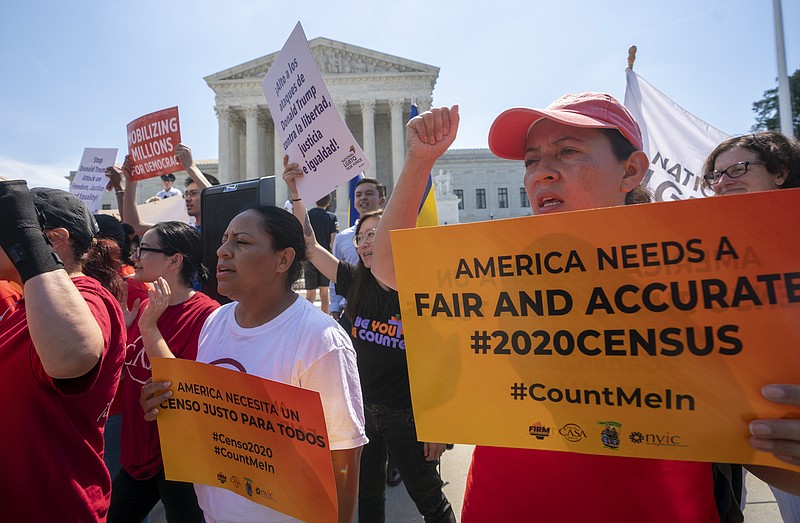It's immigration politics ...
The off-again, on-again fight over adding a citizenship question to the 2020 census form is pure Trumpian.
On June 27, the Supreme Court gave the Trump administration a major setback and striking rebuke in its effort to add a citizenship question to the 2020 Census. In a 5-4 decision, the court's four liberal members joined conservative Chief Justice John G. Roberts Jr. in rejecting the administration's stated reasons for the citizenship question - that it was necessary for the enforcement of the Voting Right Act.
It wasn't. And it never has been. The court's decision - notably written by Roberts, a GOP appointee - essentially accuses Commerce Secretary Wilbur Ross of deception and the administration of hiding its true motivations.
Clearly, the motivation is partisan through and through. Trump no doubt hopes it could dissuade undocumented immigrants from responding (for fear of disclosing their status to the government), which would dilute their representation and transfer it to areas that are more likely to be Republican-leaning.
Just consider Trump's own reasoning: "I think it's very important to find out if somebody's a citizen as opposed to an illegal. ... Democrats want to treat the illegals with health care and with other things better than they treat the citizens of our country. If you look at a coal miner that has black lung disease, you're talking about people that get treated better than the coal miner."
No. No. No. Trump's census question doesn't ask if people in the household are "illegal." It asks if people in the household are or are not citizens. They could rightly say no and still be here legally - green card holders, for instance. (As an aside, don't look now, but Trump and the GOP are themselves trying to undermine protections and compensation for coal miners with black lung disease.)
After the Supreme Court's ruling, Ross said last Tuesday the administration would abandon plans to ask the question on the 2020 Census, adding there would not be enough time for the administration to appeal its legal case and print census forms on time.
But the president threw a tweet tantrum. "The News Reports about the Department of Commerce dropping its quest to put the Citizenship Question on the Census is incorrect or, to state it differently, FAKE!" he tweeted Wednesday. "We are absolutely moving forward, as we must, because of the importance of the answer to this question."
Government lawyers then reversed course, telling a Maryland judge they "have been instructed to examine whether there is a path forward." In other words, they're looking to spin another lie - one that the court might believe - for why the question is needed.
The good news is that this is not likely - unless Trump plans to totally disregard the judicial branch of government: On Friday, he said he is considering an executive order or a potential addendum to the census questionnaire that would allow the question to be added at a later date.
The bad news is that, as a fear tactic, the talk of the question may already be working. Republicans may already have achieved their goal of frightening immigrants of all stripes from participating in government, even though federal law says the Census Bureau is not supposed to share information with law enforcement agencies.
In the words of Washington Post columnist Paul Waldman, if Trump and the GOP have already poisoned the census water, it only enhances "the political power of white people and the GOP."
... With a partisan death spiral
Unless your family was Native American, you come from immigrant stock. Trump's grandfather Friedrich Trump immigrated here from Germany. Two of his three wives are immigrants-become-citizens. We're a nation of immigrants.
The only congressional member of the Republican Party to say aloud that Donald Trump engaged in "impeachable conduct" - and also a first-generation American born to a Palestinian refugee and a Syrian mother - chose July 4th to announce his withdrawal from the GOP to become an independent.
"My parents, both immigrants, were Republicans," wrote Justin Amash, a lawyer who represents Michigan's 3rd Congressional District in the House, for a Thursday op-ed for the Washington Post. "The Republican Party, I believed, stood for limited government, economic freedom and individual liberty - principles that had made the American Dream possible for my family. In recent years, though, I've become disenchanted with party politics and frightened by what I see from it. The two-party system has evolved into an existential threat to American principles and institutions. ... Modern politics is trapped in a partisan death spiral, but there is an escape. ... Preserving liberty means telling the Republican Party and the Democratic Party that we'll no longer let them play their partisan game at our expense."
Amash, who leans decidedly libertarian, delivered a tweet storm when he decided in May that Trump should be impeached. Here's a very telling line:
"While impeachment should be undertaken only in extraordinary circumstances, the risk we face in an environment of extreme partisanship is not that Congress will employ it as a remedy too often but rather that Congress will employ it so rarely that it cannot deter misconduct."
Donald Trump demonstrates the wisdom of that statement daily.
